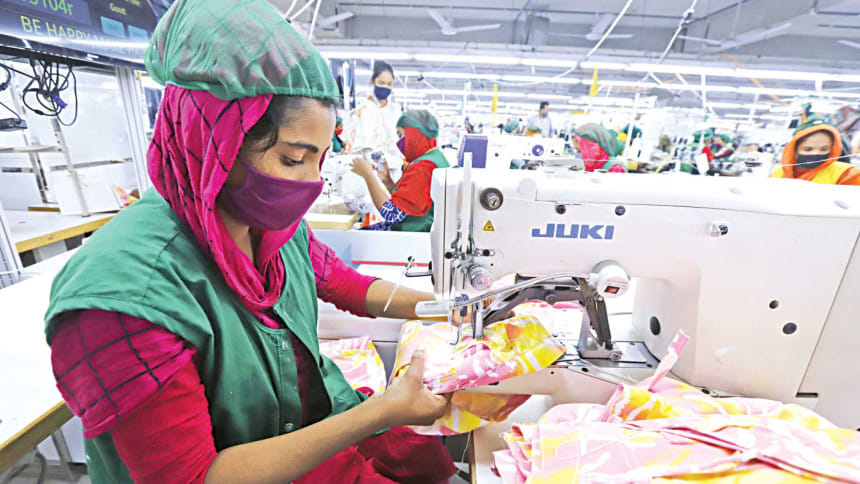In light of Covid, companies should adjust their salary policies

The Covid-19 situation may seem under control in Bangladesh right now, but it would be unwise to be complacent and think it's over. Prime Minister Sheikh Hasina recently warned that Covid may resurge in winter, bringing with it the economic hardships and uncertainties that have plagued the country—as well as the rest of the word—for more than one and a half years. In these uncertain times, employers must rethink and re-evaluate their compensation strategies, and remain flexible with their remuneration plans where possible. As companies take stock of their current financial situation and prepare for the months to come, compensation is a significant part of that assessment. There are some actions that employers can take now to mitigate the negative effects on their employees and position themselves better for financial recovery.
Be flexible with pay programmes
According to the Bangladesh Society for Human Resource Management (BSHRM), there are seven to eight million executives and staff officials in the private sector of the country. Most of these employees have felt the effects of the pandemic in one way or another. While it is true that blue-collar workers have suffered the most, managers and executives have not been spared from the pandemic's impacts either. Many employees saw salary cuts, cancellation of Eid bonuses, while some employees only received partial payments. And for those who have not felt the axe yet, the thought of impending layoffs and economic uncertainty has created a tense and unpredictable work environment.
Still, many companies have continued to support their employees to the best of their abilities during these troubled times. The large corporations with deep pockets have continued to pay their workforce despite the economic crisis, while some organisations have committed to helping their employees by offering additional financial support or making exceptions to their current compensation programmes to ensure that the employees can endure the difficult times ahead.
But not every organisation is financially capable of using these types of methods. Smaller organisations can find other ways to be flexible and supportive. For example, annual employee bonus schemes can be redistributed as emergency funds when employees need it the most, instead of disbursing them at fixed times during the year. Office equipment can be subsidised for employees who can work remotely. Also, frontline workers and others, who are doing essential jobs, are putting themselves and their families more at risk by leaving their homes and interacting with other people. These employees can be rewarded with hazard pay, which takes into account the risk of their jobs. Services such as Foodpanda and Pathao have been crucial in delivering essential services at a time when people may be reluctant to go out themselves.
Increase support for sales and marketing staff
With sales figures dropping in a lot of companies due to the pandemic, there has been a significant effect on the compensation of sales teams. Salespeople generally have a significant percentage of their total pay coming from incentive bonuses, earned as a result of successfully closing sales deals or contracts. Often, these sales commissions can make up a large portion of their monthly salaries. With the reduction in sales opportunities due to the pandemic, there has been a sharp drop in take-home pay for salespeople. As a result, many of them are more concerned about their livelihood than getting sick with Covid.
In such a situation, it is important to support your sales team both financially and in spirit, as they will be crucial to helping your organisation recover. For example, increasing the base salary ratio on a temporary basis can act as a buffer and safety net, especially when sales are down and commissions don't provide enough. At the same time, lowering the target thresholds for commission-based pay can provide some relief. Companies can try increasing accelerators for sales beyond a certain level of attainment. Other options include changing the incentive plans into a bonus plan for the next two quarters, or at least until the pandemic eases.
Re-evaluate performance benchmarks
In the current situation, companies need to rethink and re-evaluate their established performance goals, especially if the achievement of these goals are tied to compensation outcomes. Goals set at the beginning of the year might have made sense under normal circumstances, but the pandemic has changed where, when and how people work. These changes may warrant an alteration to the expected levels of performance. Productivity and performance standards might need to be measured differently due to social distancing restrictions and office closures. Companies need to reset previously held performance expectations and embrace the new normal—especially the companies who are using pay-for-performance models.
The future of pay
There is no one-size-fits-all solution when it comes to employee compensation. Companies must carefully assess their situation and find the right balance between economic survival and employee satisfaction. Effective management will save both the companies and their employees from suffering. The two must find a win-win solution. There is no doubt that budgetary challenges will be a reality in many organisations for the foreseeable future. Still, companies should strive to keep a pulse on the job market for compensation trends and market data for their jobs. Human resources professionals and business leaders should establish or re-evaluate their compensation programmes to ensure wise spending, building in flexibility, and identifying alternative options for best-case and worst-case scenarios. This pandemic will not last forever, but smart changes to compensation policies can help to nurture a productive, thriving workforce. It is this very workforce who will take the companies to new heights in the time of recovery.
Feihan Ahsan is a faculty member at Brac Business School, Brac University.

 For all latest news, follow The Daily Star's Google News channel.
For all latest news, follow The Daily Star's Google News channel. 



Comments